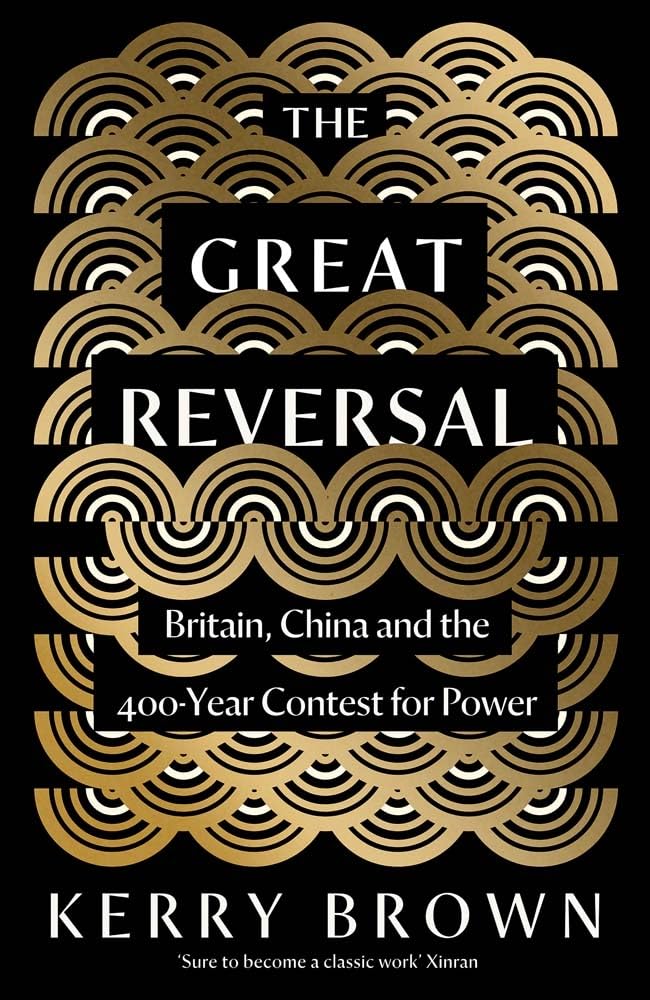| | | btw, the 400-years struggle turning out rather well, and once the world de-colonised then can move on from point whenever events went wrong-wrong, am told, and complete Industrial Revolution 4.0, along with Zheng He 2.0 space exploration, Renaissance 2.0, Huawei 6G, Belt & Road 2.0, Arctic Silk Road, cis-lunar Belt, and BRICS+ alt-UN, etc etc etc
amazon.com
A vivid history of the relationship between Britain and China, from 1600 to the present The relationship between Britain and China has shaped the modern world. Chinese art, philosophy and science have had a profound effect upon British culture, while the long history of British exploitation is still bitterly remembered in China today. But how has their interaction changed over time? From the early days of the East India Company through the violence of the Opium Wars to present-day disputes over Hong Kong, Kerry Brown charts this turbulent and intriguing relationship in full. Britain has always sought to dominate China economically and politically, while China’s ideas and exports—from tea and Chinoiserie to porcelain and silk—have continued to fascinate in the west. But by the later twentieth century, the balance of power began to shift in China’s favour, with global consequences. Brown shows how these interactions changed the world order—and argues that an understanding of Britain’s relationship with China is now more vital than ever.
kcl.ac.uk
Book talk - The Great Reversal: Britain, China and the 400-Year Contest for Power
18 September 2024 18:00 to 19:00 Starting from the two countries’ first contact over four hundred years ago, The Great Reversal: Britain, China and the 400-Year Contest for Power by Kerry Brown charts Britain and China’s important and consequential relationship using archival research and hundreds of separate studies. Brown’s unique insights into this period help tell a vivid story that mixes mutual fascination and influence, culturally and economically, with the harsh reality of violent conflict at a time when Britain was the most advanced industrial power globally and China was still wrestling with its own attempts to modernise and reform. Current UK-China relations have encountered increased turbulence, making it more important than ever to understand their rich and complex joint history. Despite their differences, Britain and China have profoundly shaped and formed each other, and the surrounding world. Sino-British relations are, in many ways, the story of modernity. Join us at 6pm on Wednesday 18 September for an exploration into Britain's history with China and why an understanding of this relationship is important now more than ever with Kerry Brown, in conversation with Mark Logan. About the speakers Kerry Brown is Professor of Chinese Studies and Director of the Lau China Institute at King’s College, London. From 2012 to 2015 he was Professor of Chinese Politics and Director of the China Studies Centre at the University of Sydney, Australia. Prior to this he worked at Chatham House from 2006 to 2012, as Senior Fellow and then Head of the Asia Programme. From 1998 to 2005 he worked at the British Foreign and Commonwealth Office, as First Secretary at the British Embassy in Beijing, and then as Head of the Indonesia, Philippine and East Timor Section. He previously graduated from Cambridge University and has a PhD in Chinese politics and language from Leeds University. He is the author of 20 books on modern Chinese politics. Mark Logan is a former Member of Parliament (2019-24), was a Vice-Chair on the All Party Parliamentary China Group, holds two advanced degrees in China-related studies, and speaks fluent Mandarin with a splash of Shanghai dialect. Before entering politics he served in China with the Foreign Office, and has a number of years experience in the private sector, again within East Asia. He is a consultant and learning Japanese, the obsession with Kanji/Chinese characters never dies.
rsaa.org.uk
The Great Reversal: Britain, China and the 400-Year Contest for Power
Professor Kerry Brown, 1 October 2024 14.00 BST
At the Royal Astronomical Society and online CLICK HERE TO REGISTERThe relationship between Britain and China has shaped the modern world. Chinese art, philosophy and science have had a profound effect upon British culture, while the long history of British exploitation is still bitterly remembered in China today. But how has their interaction changed over time?
From the early days of the East India Company through the violence of the Opium Wars to present-day disputes over Hong Kong, Kerry Brown charts this turbulent and intriguing relationship in full. Britain has always sought to dominate China economically and politically, while China’s ideas and exports—from tea and Chinoiserie to porcelain and silk—have continued to fascinate in the west. But by the later twentieth century, the balance of power began to shift in China’s favour, with global consequences. Brown shows how these interactions changed the world order—and argues that an understanding of Britain’s relationship with China is now more vital than ever.

Kerry Brown is Professor of Chinese Studies and Director of the Lau China Institute at King’s College, London. From 2012 to 2015, he was Professor of Chinese Politics and Director of the China Studies Centre at the University of Sydney, Australia. Prior to this he worked at Chatham House, as Senior Fellow and then Head of the Asia Programme. From 1998 to 2005 he worked at the British Foreign and Commonwealth Office, as First Secretary at the British Embassy in Beijing, and then as Head of the Indonesia, Philippine and East Timor Section. He is the author of twenty books on modern Chinese politics and a trustee of the Royal Society for Asian Affairs.
 |
|






